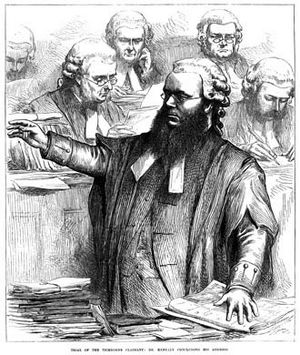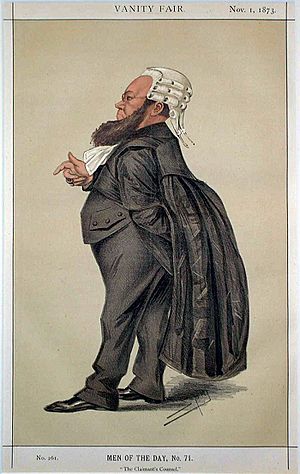Edward Kenealy facts for kids
Edward Vaughan Hyde Kenealy (born July 2, 1819 – died April 16, 1880) was an Irish lawyer and writer. He is best known for being the main lawyer in a very famous and unusual court case called the Tichborne case. His strange behavior during this trial caused him a lot of problems later on.
Contents
Early Life and Legal Career
Edward Kenealy was born in Cork, Ireland. His father was a local merchant. He went to Trinity College Dublin for his education. After his studies, he became a qualified lawyer in Ireland in 1840. A few years later, in 1847, he also qualified to practice law in England.
He became quite good at handling criminal cases. In 1868, he was recognized as a senior lawyer, known as a QC. He also became a leader at Gray's Inn, which is one of the important legal societies in London.
Famous Cases Kenealy Worked On
Edward Kenealy worked on several important court cases during his career. These included:
- Defending people accused of serious crimes in 1848.
- Working as a junior lawyer in the defense of William Palmer, who was accused of poisoning someone, in 1856. They did not win this case.
- Defending Ricard O'Sullivan Burke during the Fenian Rising in 1867. Kenealy stopped working on this case after a failed attempt to help his clients escape.
- Bringing charges against the leaders of a company called Overend, Gurney and Company for fraud in 1869, after the company failed.
- Becoming the main lawyer for Arthur Orton, also known as Roger Tichborne, in April 1873. This was the start of the very famous Tichborne case.
Private Life and Writings
Edward Kenealy had diabetes, a health condition that can sometimes affect a person's mood. In 1851, he married Elizabeth Nicklin, and they had eleven children together. One of their children was the novelist Arabella Kenealy. The family lived in Portslade, East Sussex, for many years. Edward would travel to London and Oxford for his legal work, but he always returned home to his family on weekends.
Kenealy was also a writer. In 1850, he published an unusual poem called Goethe, a New Pantomime. He wrote many poems for different journals, like Fraser's Magazine. He also translated texts from many different languages, including Latin, Greek, German, and Arabic. It's thought he might not have been fluent in all of them.
In 1866, Kenealy wrote a book about religion called The Book of God: the Apocalypse of Adam-Oannes. In this book, he made some very unusual claims, saying he was a special "messenger of God" and that he was related to Jesus Christ and Genghis Khan. He also wrote a more traditional biography of Edward Wortley Montagu in 1869.
The Tichborne Case
The Tichborne Case was a very long and famous trial. During this trial, Edward Kenealy behaved in a very unusual way. He was often rude to witnesses and made strong accusations against various Catholic groups. He also showed disrespect to the judges. His actions made the trial last for a very long time, making it the longest in English legal history.
His aggressive way of handling the case became a public scandal. After the jury decided that his client's claim was false, they also criticized Kenealy's behavior.
After the Trial
After the Tichborne case, Kenealy started his own newspaper called The Englishman. He used it to defend himself and to criticize the judges involved in the trial. His behavior was so extreme that in 1874, he was removed from his legal society and was no longer allowed to practice law. His special title as a senior lawyer (QC) was also taken away.
He then created a group called the Magna Charta Association. He traveled around the country, giving speeches to protest what had happened to him.
Kenealy in Parliament
In 1875, Edward Kenealy was elected to Parliament as a representative for Stoke-upon-Trent. He won by a large number of votes. However, when he arrived in Parliament, no other Member of Parliament wanted to formally introduce him, which was a tradition. Benjamin Disraeli, a powerful politician at the time, had to make a special request to allow Kenealy to take his seat without this introduction.
Once in Parliament, Kenealy asked for a special investigation into his conduct during the Tichborne case. However, his request was largely rejected, with only 3 votes in favor and 433 against. During this time, he also wrote a nine-book account of the Tichborne case.
Edward Kenealy, who was often called "Dr. Kenealy," gradually became less well-known. He lost his seat in Parliament in the 1880 election. He passed away in London at the age of 60, before the election results were even fully known. He is buried in the churchyard of St Helen's Church, Hangleton, in East Sussex.
 | Janet Taylor Pickett |
 | Synthia Saint James |
 | Howardena Pindell |
 | Faith Ringgold |



